Entrepreneurship Report: Ventures, Economy, Traits, and Skills
VerifiedAdded on 2020/07/23
|16
|4628
|34
Report
AI Summary
This report provides a comprehensive overview of entrepreneurship, exploring various types of entrepreneurial ventures, including small businesses, scalable start-ups, and social enterprises. It analyzes the differences and similarities between different entrepreneurial ventures, such as lifestyle vs. serial businesses, and male vs. female entrepreneurs. The report further examines the impact of small and micro businesses on the economy, highlighting their contribution to employment, foreign direct investment, and rural development. It also emphasizes the importance of small businesses and start-ups to the overall economic growth. Furthermore, the report delves into the traits, skills, and characteristics of successful entrepreneurs, assessing the aspects of personality reflecting an entrepreneurial mindset and motivation. Finally, it explores how experience and background can sometimes hinder entrepreneurial endeavors. The report draws on academic sources and provides a well-structured analysis of the key aspects of entrepreneurship.

ENTREPRENEURSHIP
Paraphrase This Document
Need a fresh take? Get an instant paraphrase of this document with our AI Paraphraser
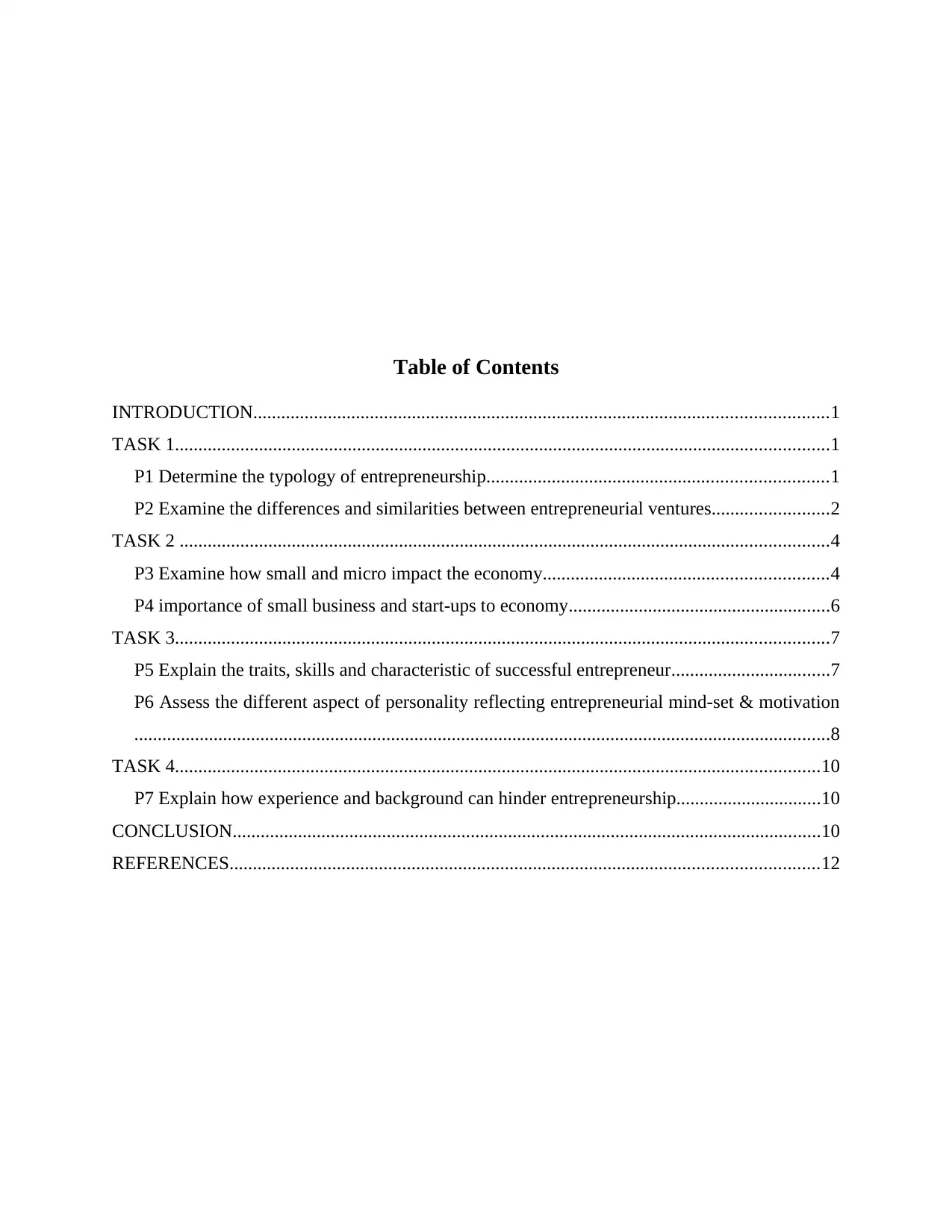
Table of Contents
INTRODUCTION...........................................................................................................................1
TASK 1............................................................................................................................................1
P1 Determine the typology of entrepreneurship.........................................................................1
P2 Examine the differences and similarities between entrepreneurial ventures.........................2
TASK 2 ...........................................................................................................................................4
P3 Examine how small and micro impact the economy.............................................................4
P4 importance of small business and start-ups to economy........................................................6
TASK 3............................................................................................................................................7
P5 Explain the traits, skills and characteristic of successful entrepreneur..................................7
P6 Assess the different aspect of personality reflecting entrepreneurial mind-set & motivation
.....................................................................................................................................................8
TASK 4..........................................................................................................................................10
P7 Explain how experience and background can hinder entrepreneurship...............................10
CONCLUSION..............................................................................................................................10
REFERENCES..............................................................................................................................12
INTRODUCTION...........................................................................................................................1
TASK 1............................................................................................................................................1
P1 Determine the typology of entrepreneurship.........................................................................1
P2 Examine the differences and similarities between entrepreneurial ventures.........................2
TASK 2 ...........................................................................................................................................4
P3 Examine how small and micro impact the economy.............................................................4
P4 importance of small business and start-ups to economy........................................................6
TASK 3............................................................................................................................................7
P5 Explain the traits, skills and characteristic of successful entrepreneur..................................7
P6 Assess the different aspect of personality reflecting entrepreneurial mind-set & motivation
.....................................................................................................................................................8
TASK 4..........................................................................................................................................10
P7 Explain how experience and background can hinder entrepreneurship...............................10
CONCLUSION..............................................................................................................................10
REFERENCES..............................................................................................................................12

⊘ This is a preview!⊘
Do you want full access?
Subscribe today to unlock all pages.

Trusted by 1+ million students worldwide
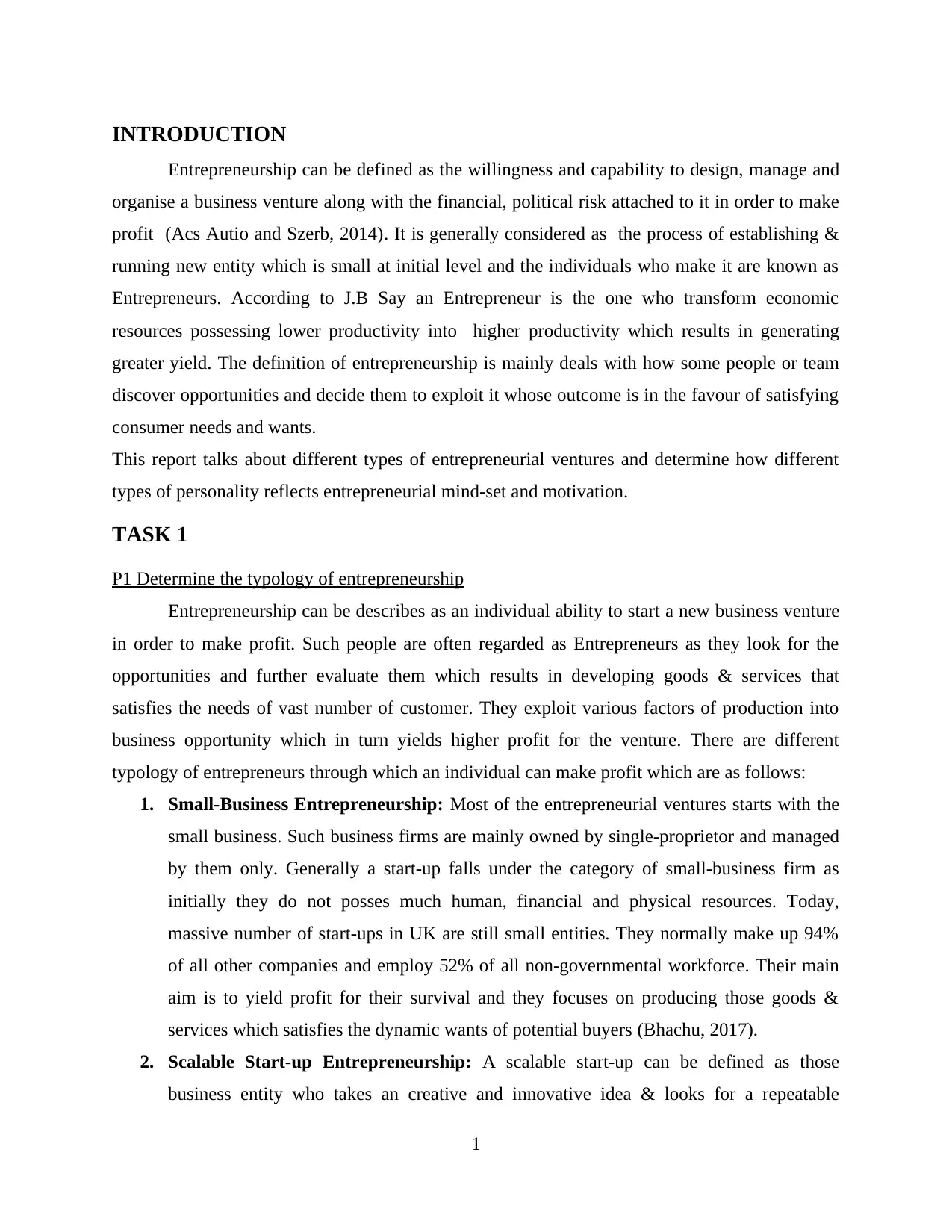
INTRODUCTION
Entrepreneurship can be defined as the willingness and capability to design, manage and
organise a business venture along with the financial, political risk attached to it in order to make
profit (Acs Autio and Szerb, 2014). It is generally considered as the process of establishing &
running new entity which is small at initial level and the individuals who make it are known as
Entrepreneurs. According to J.B Say an Entrepreneur is the one who transform economic
resources possessing lower productivity into higher productivity which results in generating
greater yield. The definition of entrepreneurship is mainly deals with how some people or team
discover opportunities and decide them to exploit it whose outcome is in the favour of satisfying
consumer needs and wants.
This report talks about different types of entrepreneurial ventures and determine how different
types of personality reflects entrepreneurial mind-set and motivation.
TASK 1
P1 Determine the typology of entrepreneurship
Entrepreneurship can be describes as an individual ability to start a new business venture
in order to make profit. Such people are often regarded as Entrepreneurs as they look for the
opportunities and further evaluate them which results in developing goods & services that
satisfies the needs of vast number of customer. They exploit various factors of production into
business opportunity which in turn yields higher profit for the venture. There are different
typology of entrepreneurs through which an individual can make profit which are as follows:
1. Small-Business Entrepreneurship: Most of the entrepreneurial ventures starts with the
small business. Such business firms are mainly owned by single-proprietor and managed
by them only. Generally a start-up falls under the category of small-business firm as
initially they do not posses much human, financial and physical resources. Today,
massive number of start-ups in UK are still small entities. They normally make up 94%
of all other companies and employ 52% of all non-governmental workforce. Their main
aim is to yield profit for their survival and they focuses on producing those goods &
services which satisfies the dynamic wants of potential buyers (Bhachu, 2017).
2. Scalable Start-up Entrepreneurship: A scalable start-up can be defined as those
business entity who takes an creative and innovative idea & looks for a repeatable
1
Entrepreneurship can be defined as the willingness and capability to design, manage and
organise a business venture along with the financial, political risk attached to it in order to make
profit (Acs Autio and Szerb, 2014). It is generally considered as the process of establishing &
running new entity which is small at initial level and the individuals who make it are known as
Entrepreneurs. According to J.B Say an Entrepreneur is the one who transform economic
resources possessing lower productivity into higher productivity which results in generating
greater yield. The definition of entrepreneurship is mainly deals with how some people or team
discover opportunities and decide them to exploit it whose outcome is in the favour of satisfying
consumer needs and wants.
This report talks about different types of entrepreneurial ventures and determine how different
types of personality reflects entrepreneurial mind-set and motivation.
TASK 1
P1 Determine the typology of entrepreneurship
Entrepreneurship can be describes as an individual ability to start a new business venture
in order to make profit. Such people are often regarded as Entrepreneurs as they look for the
opportunities and further evaluate them which results in developing goods & services that
satisfies the needs of vast number of customer. They exploit various factors of production into
business opportunity which in turn yields higher profit for the venture. There are different
typology of entrepreneurs through which an individual can make profit which are as follows:
1. Small-Business Entrepreneurship: Most of the entrepreneurial ventures starts with the
small business. Such business firms are mainly owned by single-proprietor and managed
by them only. Generally a start-up falls under the category of small-business firm as
initially they do not posses much human, financial and physical resources. Today,
massive number of start-ups in UK are still small entities. They normally make up 94%
of all other companies and employ 52% of all non-governmental workforce. Their main
aim is to yield profit for their survival and they focuses on producing those goods &
services which satisfies the dynamic wants of potential buyers (Bhachu, 2017).
2. Scalable Start-up Entrepreneurship: A scalable start-up can be defined as those
business entity who takes an creative and innovative idea & looks for a repeatable
1
Paraphrase This Document
Need a fresh take? Get an instant paraphrase of this document with our AI Paraphraser
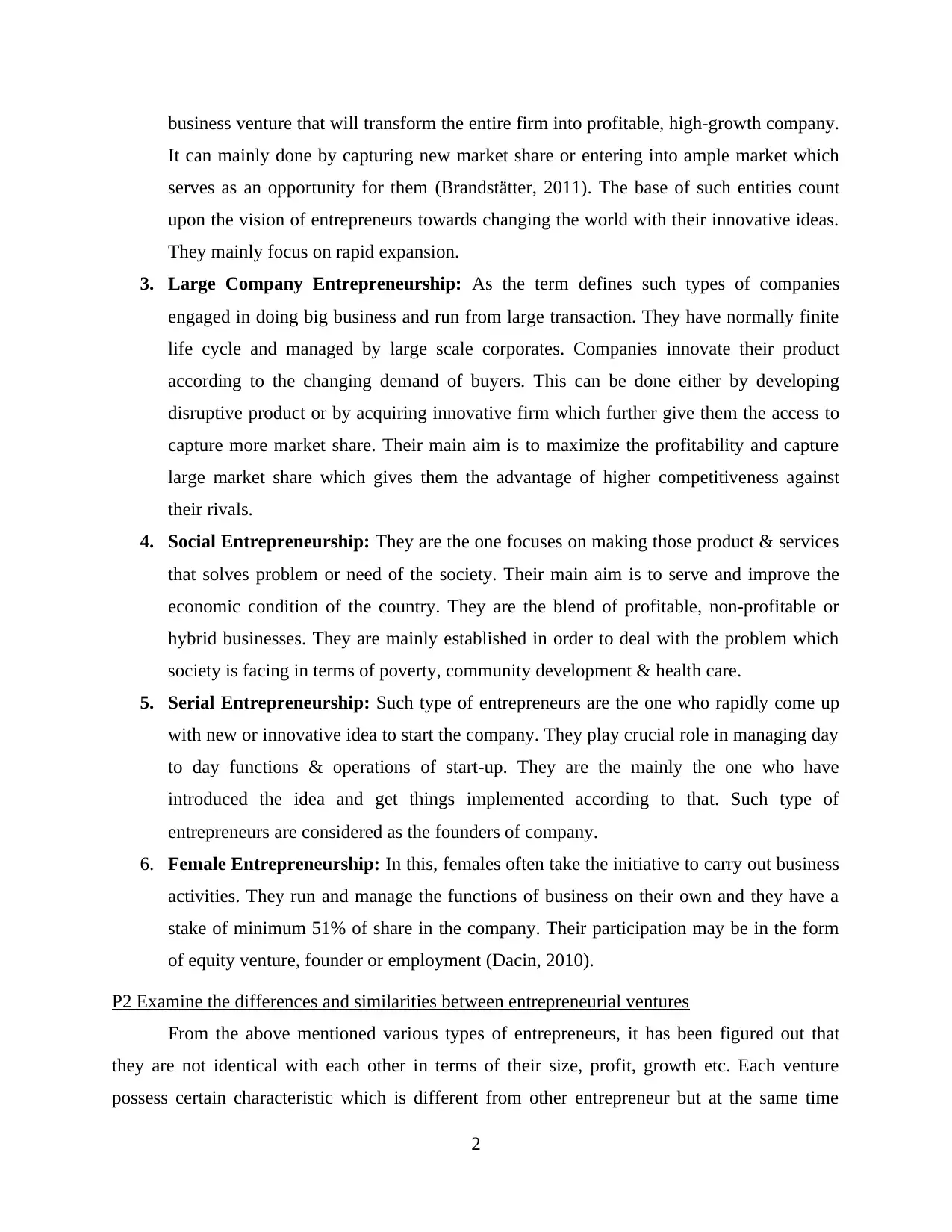
business venture that will transform the entire firm into profitable, high-growth company.
It can mainly done by capturing new market share or entering into ample market which
serves as an opportunity for them (Brandstätter, 2011). The base of such entities count
upon the vision of entrepreneurs towards changing the world with their innovative ideas.
They mainly focus on rapid expansion.
3. Large Company Entrepreneurship: As the term defines such types of companies
engaged in doing big business and run from large transaction. They have normally finite
life cycle and managed by large scale corporates. Companies innovate their product
according to the changing demand of buyers. This can be done either by developing
disruptive product or by acquiring innovative firm which further give them the access to
capture more market share. Their main aim is to maximize the profitability and capture
large market share which gives them the advantage of higher competitiveness against
their rivals.
4. Social Entrepreneurship: They are the one focuses on making those product & services
that solves problem or need of the society. Their main aim is to serve and improve the
economic condition of the country. They are the blend of profitable, non-profitable or
hybrid businesses. They are mainly established in order to deal with the problem which
society is facing in terms of poverty, community development & health care.
5. Serial Entrepreneurship: Such type of entrepreneurs are the one who rapidly come up
with new or innovative idea to start the company. They play crucial role in managing day
to day functions & operations of start-up. They are the mainly the one who have
introduced the idea and get things implemented according to that. Such type of
entrepreneurs are considered as the founders of company.
6. Female Entrepreneurship: In this, females often take the initiative to carry out business
activities. They run and manage the functions of business on their own and they have a
stake of minimum 51% of share in the company. Their participation may be in the form
of equity venture, founder or employment (Dacin, 2010).
P2 Examine the differences and similarities between entrepreneurial ventures
From the above mentioned various types of entrepreneurs, it has been figured out that
they are not identical with each other in terms of their size, profit, growth etc. Each venture
possess certain characteristic which is different from other entrepreneur but at the same time
2
It can mainly done by capturing new market share or entering into ample market which
serves as an opportunity for them (Brandstätter, 2011). The base of such entities count
upon the vision of entrepreneurs towards changing the world with their innovative ideas.
They mainly focus on rapid expansion.
3. Large Company Entrepreneurship: As the term defines such types of companies
engaged in doing big business and run from large transaction. They have normally finite
life cycle and managed by large scale corporates. Companies innovate their product
according to the changing demand of buyers. This can be done either by developing
disruptive product or by acquiring innovative firm which further give them the access to
capture more market share. Their main aim is to maximize the profitability and capture
large market share which gives them the advantage of higher competitiveness against
their rivals.
4. Social Entrepreneurship: They are the one focuses on making those product & services
that solves problem or need of the society. Their main aim is to serve and improve the
economic condition of the country. They are the blend of profitable, non-profitable or
hybrid businesses. They are mainly established in order to deal with the problem which
society is facing in terms of poverty, community development & health care.
5. Serial Entrepreneurship: Such type of entrepreneurs are the one who rapidly come up
with new or innovative idea to start the company. They play crucial role in managing day
to day functions & operations of start-up. They are the mainly the one who have
introduced the idea and get things implemented according to that. Such type of
entrepreneurs are considered as the founders of company.
6. Female Entrepreneurship: In this, females often take the initiative to carry out business
activities. They run and manage the functions of business on their own and they have a
stake of minimum 51% of share in the company. Their participation may be in the form
of equity venture, founder or employment (Dacin, 2010).
P2 Examine the differences and similarities between entrepreneurial ventures
From the above mentioned various types of entrepreneurs, it has been figured out that
they are not identical with each other in terms of their size, profit, growth etc. Each venture
possess certain characteristic which is different from other entrepreneur but at the same time
2
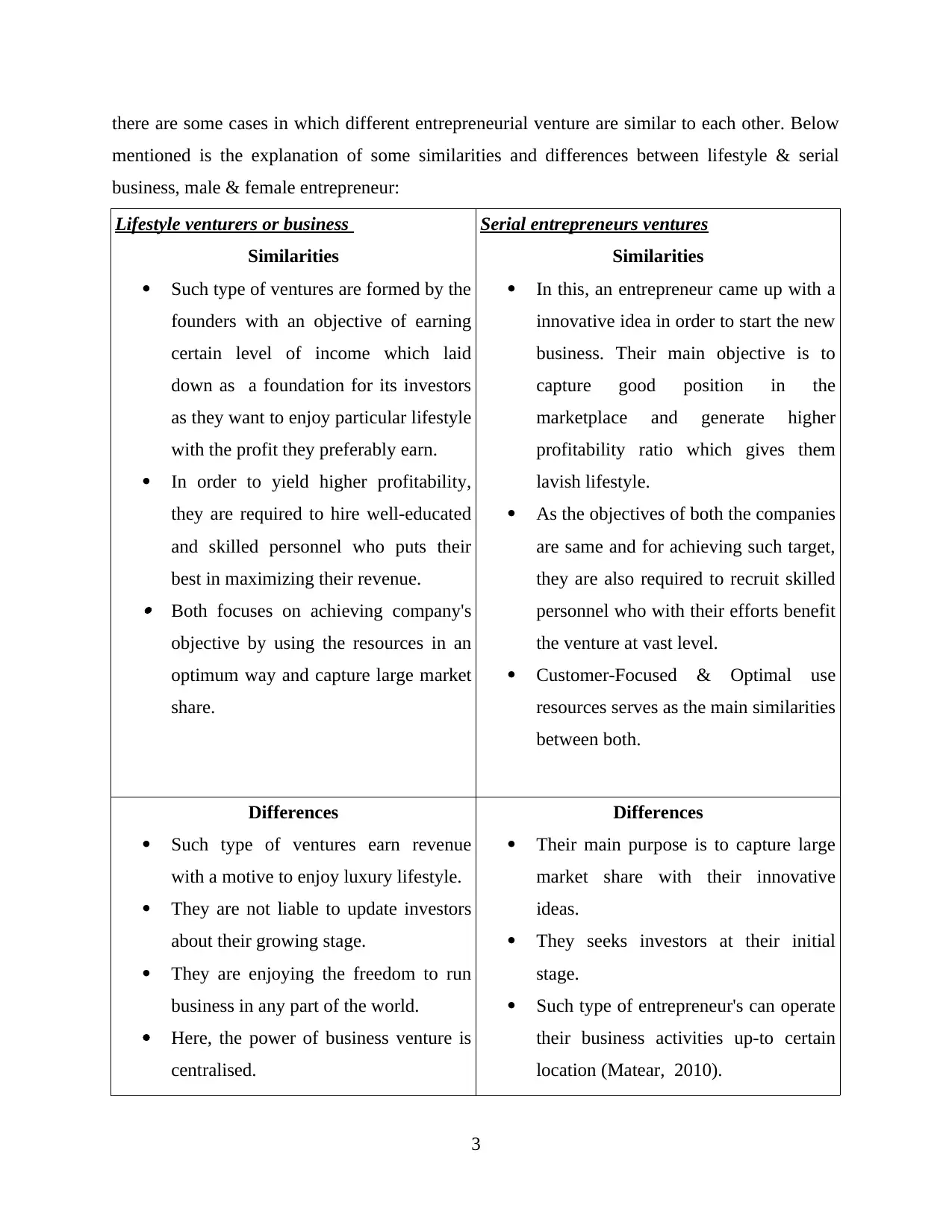
there are some cases in which different entrepreneurial venture are similar to each other. Below
mentioned is the explanation of some similarities and differences between lifestyle & serial
business, male & female entrepreneur:
Lifestyle venturers or business
Similarities
Such type of ventures are formed by the
founders with an objective of earning
certain level of income which laid
down as a foundation for its investors
as they want to enjoy particular lifestyle
with the profit they preferably earn.
In order to yield higher profitability,
they are required to hire well-educated
and skilled personnel who puts their
best in maximizing their revenue. Both focuses on achieving company's
objective by using the resources in an
optimum way and capture large market
share.
Serial entrepreneurs ventures
Similarities
In this, an entrepreneur came up with a
innovative idea in order to start the new
business. Their main objective is to
capture good position in the
marketplace and generate higher
profitability ratio which gives them
lavish lifestyle.
As the objectives of both the companies
are same and for achieving such target,
they are also required to recruit skilled
personnel who with their efforts benefit
the venture at vast level.
Customer-Focused & Optimal use
resources serves as the main similarities
between both.
Differences
Such type of ventures earn revenue
with a motive to enjoy luxury lifestyle.
They are not liable to update investors
about their growing stage.
They are enjoying the freedom to run
business in any part of the world.
Here, the power of business venture is
centralised.
Differences
Their main purpose is to capture large
market share with their innovative
ideas.
They seeks investors at their initial
stage.
Such type of entrepreneur's can operate
their business activities up-to certain
location (Matear, 2010).
3
mentioned is the explanation of some similarities and differences between lifestyle & serial
business, male & female entrepreneur:
Lifestyle venturers or business
Similarities
Such type of ventures are formed by the
founders with an objective of earning
certain level of income which laid
down as a foundation for its investors
as they want to enjoy particular lifestyle
with the profit they preferably earn.
In order to yield higher profitability,
they are required to hire well-educated
and skilled personnel who puts their
best in maximizing their revenue. Both focuses on achieving company's
objective by using the resources in an
optimum way and capture large market
share.
Serial entrepreneurs ventures
Similarities
In this, an entrepreneur came up with a
innovative idea in order to start the new
business. Their main objective is to
capture good position in the
marketplace and generate higher
profitability ratio which gives them
lavish lifestyle.
As the objectives of both the companies
are same and for achieving such target,
they are also required to recruit skilled
personnel who with their efforts benefit
the venture at vast level.
Customer-Focused & Optimal use
resources serves as the main similarities
between both.
Differences
Such type of ventures earn revenue
with a motive to enjoy luxury lifestyle.
They are not liable to update investors
about their growing stage.
They are enjoying the freedom to run
business in any part of the world.
Here, the power of business venture is
centralised.
Differences
Their main purpose is to capture large
market share with their innovative
ideas.
They seeks investors at their initial
stage.
Such type of entrepreneur's can operate
their business activities up-to certain
location (Matear, 2010).
3
⊘ This is a preview!⊘
Do you want full access?
Subscribe today to unlock all pages.

Trusted by 1+ million students worldwide
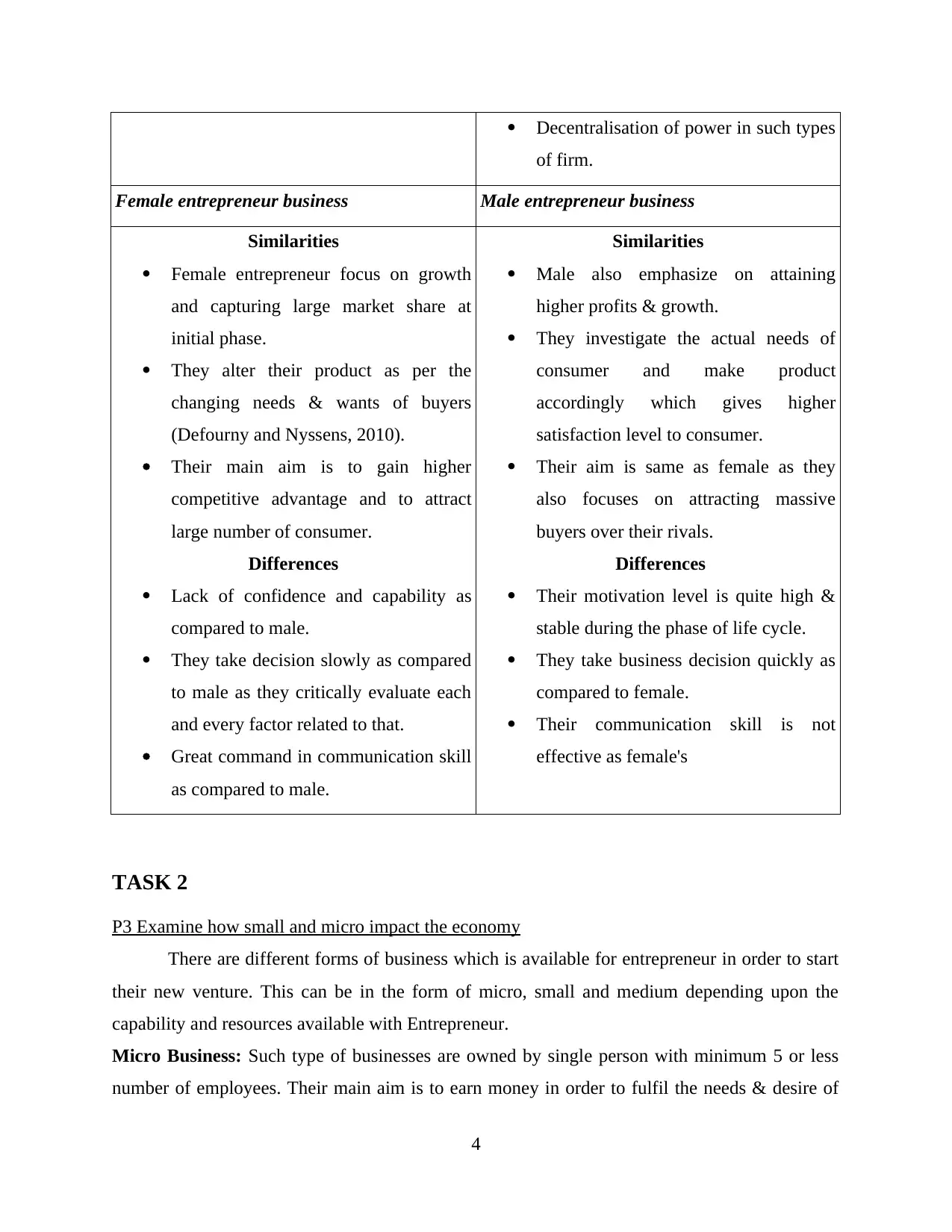
Decentralisation of power in such types
of firm.
Female entrepreneur business Male entrepreneur business
Similarities
Female entrepreneur focus on growth
and capturing large market share at
initial phase.
They alter their product as per the
changing needs & wants of buyers
(Defourny and Nyssens, 2010).
Their main aim is to gain higher
competitive advantage and to attract
large number of consumer.
Differences
Lack of confidence and capability as
compared to male.
They take decision slowly as compared
to male as they critically evaluate each
and every factor related to that.
Great command in communication skill
as compared to male.
Similarities
Male also emphasize on attaining
higher profits & growth.
They investigate the actual needs of
consumer and make product
accordingly which gives higher
satisfaction level to consumer.
Their aim is same as female as they
also focuses on attracting massive
buyers over their rivals.
Differences
Their motivation level is quite high &
stable during the phase of life cycle.
They take business decision quickly as
compared to female.
Their communication skill is not
effective as female's
TASK 2
P3 Examine how small and micro impact the economy
There are different forms of business which is available for entrepreneur in order to start
their new venture. This can be in the form of micro, small and medium depending upon the
capability and resources available with Entrepreneur.
Micro Business: Such type of businesses are owned by single person with minimum 5 or less
number of employees. Their main aim is to earn money in order to fulfil the needs & desire of
4
of firm.
Female entrepreneur business Male entrepreneur business
Similarities
Female entrepreneur focus on growth
and capturing large market share at
initial phase.
They alter their product as per the
changing needs & wants of buyers
(Defourny and Nyssens, 2010).
Their main aim is to gain higher
competitive advantage and to attract
large number of consumer.
Differences
Lack of confidence and capability as
compared to male.
They take decision slowly as compared
to male as they critically evaluate each
and every factor related to that.
Great command in communication skill
as compared to male.
Similarities
Male also emphasize on attaining
higher profits & growth.
They investigate the actual needs of
consumer and make product
accordingly which gives higher
satisfaction level to consumer.
Their aim is same as female as they
also focuses on attracting massive
buyers over their rivals.
Differences
Their motivation level is quite high &
stable during the phase of life cycle.
They take business decision quickly as
compared to female.
Their communication skill is not
effective as female's
TASK 2
P3 Examine how small and micro impact the economy
There are different forms of business which is available for entrepreneur in order to start
their new venture. This can be in the form of micro, small and medium depending upon the
capability and resources available with Entrepreneur.
Micro Business: Such type of businesses are owned by single person with minimum 5 or less
number of employees. Their main aim is to earn money in order to fulfil the needs & desire of
4
Paraphrase This Document
Need a fresh take? Get an instant paraphrase of this document with our AI Paraphraser
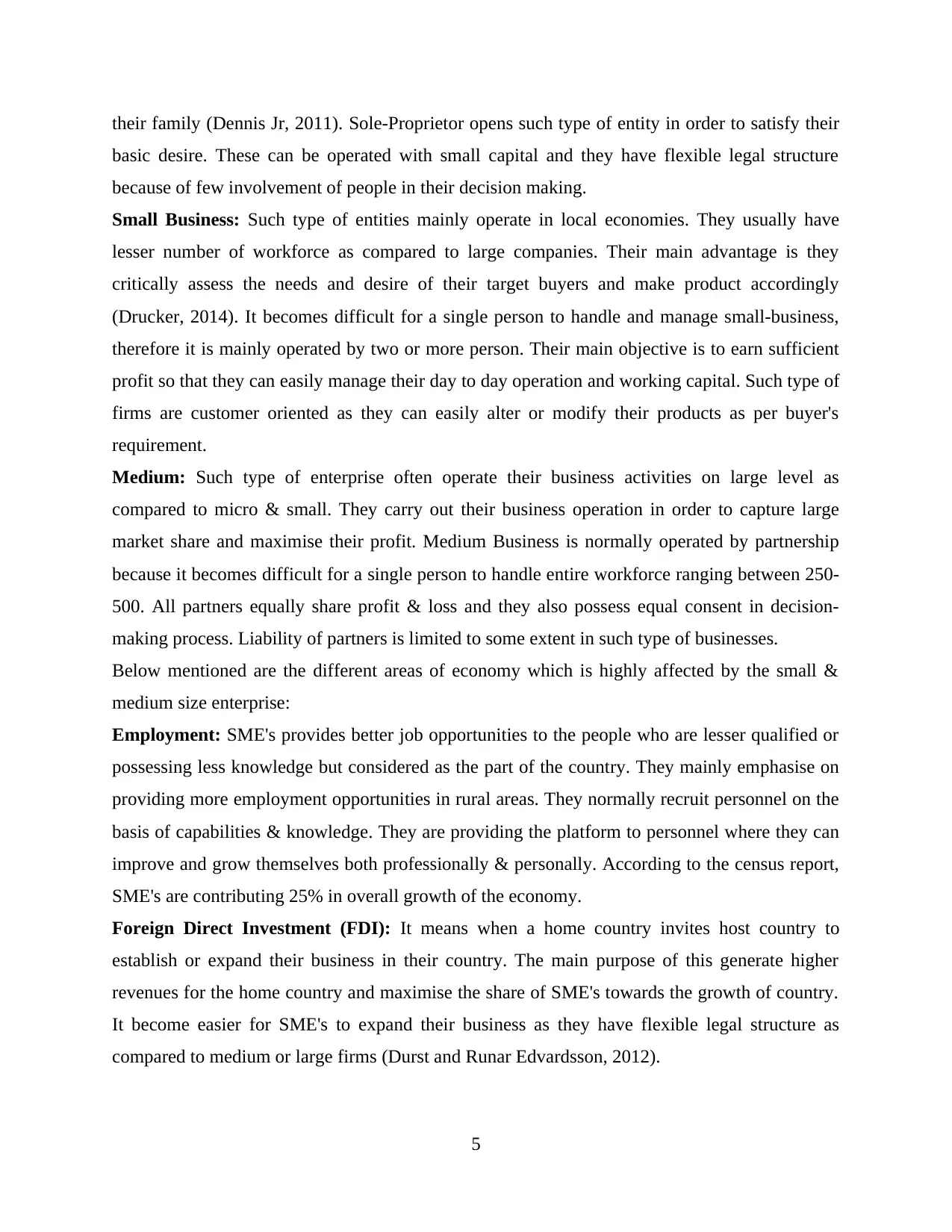
their family (Dennis Jr, 2011). Sole-Proprietor opens such type of entity in order to satisfy their
basic desire. These can be operated with small capital and they have flexible legal structure
because of few involvement of people in their decision making.
Small Business: Such type of entities mainly operate in local economies. They usually have
lesser number of workforce as compared to large companies. Their main advantage is they
critically assess the needs and desire of their target buyers and make product accordingly
(Drucker, 2014). It becomes difficult for a single person to handle and manage small-business,
therefore it is mainly operated by two or more person. Their main objective is to earn sufficient
profit so that they can easily manage their day to day operation and working capital. Such type of
firms are customer oriented as they can easily alter or modify their products as per buyer's
requirement.
Medium: Such type of enterprise often operate their business activities on large level as
compared to micro & small. They carry out their business operation in order to capture large
market share and maximise their profit. Medium Business is normally operated by partnership
because it becomes difficult for a single person to handle entire workforce ranging between 250-
500. All partners equally share profit & loss and they also possess equal consent in decision-
making process. Liability of partners is limited to some extent in such type of businesses.
Below mentioned are the different areas of economy which is highly affected by the small &
medium size enterprise:
Employment: SME's provides better job opportunities to the people who are lesser qualified or
possessing less knowledge but considered as the part of the country. They mainly emphasise on
providing more employment opportunities in rural areas. They normally recruit personnel on the
basis of capabilities & knowledge. They are providing the platform to personnel where they can
improve and grow themselves both professionally & personally. According to the census report,
SME's are contributing 25% in overall growth of the economy.
Foreign Direct Investment (FDI): It means when a home country invites host country to
establish or expand their business in their country. The main purpose of this generate higher
revenues for the home country and maximise the share of SME's towards the growth of country.
It become easier for SME's to expand their business as they have flexible legal structure as
compared to medium or large firms (Durst and Runar Edvardsson, 2012).
5
basic desire. These can be operated with small capital and they have flexible legal structure
because of few involvement of people in their decision making.
Small Business: Such type of entities mainly operate in local economies. They usually have
lesser number of workforce as compared to large companies. Their main advantage is they
critically assess the needs and desire of their target buyers and make product accordingly
(Drucker, 2014). It becomes difficult for a single person to handle and manage small-business,
therefore it is mainly operated by two or more person. Their main objective is to earn sufficient
profit so that they can easily manage their day to day operation and working capital. Such type of
firms are customer oriented as they can easily alter or modify their products as per buyer's
requirement.
Medium: Such type of enterprise often operate their business activities on large level as
compared to micro & small. They carry out their business operation in order to capture large
market share and maximise their profit. Medium Business is normally operated by partnership
because it becomes difficult for a single person to handle entire workforce ranging between 250-
500. All partners equally share profit & loss and they also possess equal consent in decision-
making process. Liability of partners is limited to some extent in such type of businesses.
Below mentioned are the different areas of economy which is highly affected by the small &
medium size enterprise:
Employment: SME's provides better job opportunities to the people who are lesser qualified or
possessing less knowledge but considered as the part of the country. They mainly emphasise on
providing more employment opportunities in rural areas. They normally recruit personnel on the
basis of capabilities & knowledge. They are providing the platform to personnel where they can
improve and grow themselves both professionally & personally. According to the census report,
SME's are contributing 25% in overall growth of the economy.
Foreign Direct Investment (FDI): It means when a home country invites host country to
establish or expand their business in their country. The main purpose of this generate higher
revenues for the home country and maximise the share of SME's towards the growth of country.
It become easier for SME's to expand their business as they have flexible legal structure as
compared to medium or large firms (Durst and Runar Edvardsson, 2012).
5
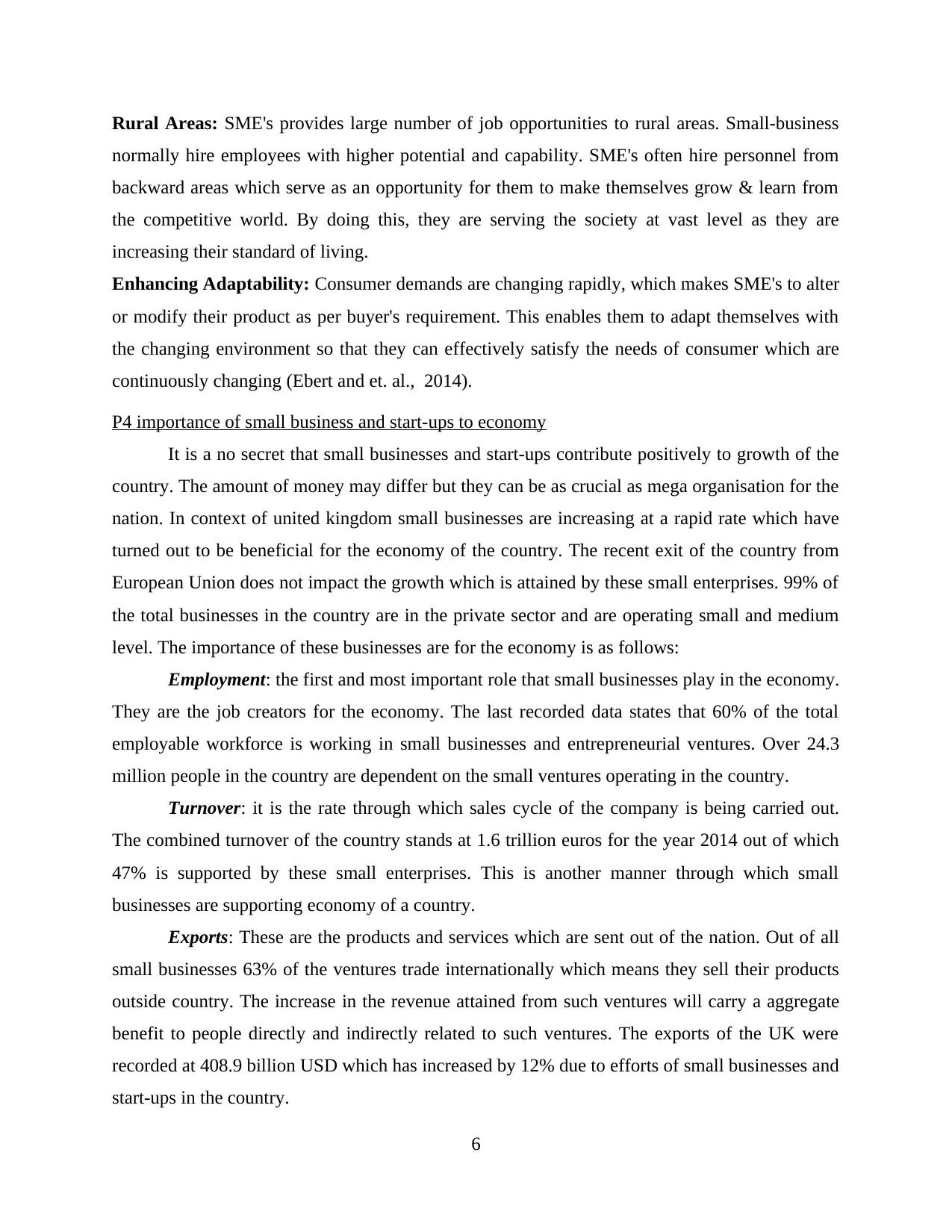
Rural Areas: SME's provides large number of job opportunities to rural areas. Small-business
normally hire employees with higher potential and capability. SME's often hire personnel from
backward areas which serve as an opportunity for them to make themselves grow & learn from
the competitive world. By doing this, they are serving the society at vast level as they are
increasing their standard of living.
Enhancing Adaptability: Consumer demands are changing rapidly, which makes SME's to alter
or modify their product as per buyer's requirement. This enables them to adapt themselves with
the changing environment so that they can effectively satisfy the needs of consumer which are
continuously changing (Ebert and et. al., 2014).
P4 importance of small business and start-ups to economy
It is a no secret that small businesses and start-ups contribute positively to growth of the
country. The amount of money may differ but they can be as crucial as mega organisation for the
nation. In context of united kingdom small businesses are increasing at a rapid rate which have
turned out to be beneficial for the economy of the country. The recent exit of the country from
European Union does not impact the growth which is attained by these small enterprises. 99% of
the total businesses in the country are in the private sector and are operating small and medium
level. The importance of these businesses are for the economy is as follows:
Employment: the first and most important role that small businesses play in the economy.
They are the job creators for the economy. The last recorded data states that 60% of the total
employable workforce is working in small businesses and entrepreneurial ventures. Over 24.3
million people in the country are dependent on the small ventures operating in the country.
Turnover: it is the rate through which sales cycle of the company is being carried out.
The combined turnover of the country stands at 1.6 trillion euros for the year 2014 out of which
47% is supported by these small enterprises. This is another manner through which small
businesses are supporting economy of a country.
Exports: These are the products and services which are sent out of the nation. Out of all
small businesses 63% of the ventures trade internationally which means they sell their products
outside country. The increase in the revenue attained from such ventures will carry a aggregate
benefit to people directly and indirectly related to such ventures. The exports of the UK were
recorded at 408.9 billion USD which has increased by 12% due to efforts of small businesses and
start-ups in the country.
6
normally hire employees with higher potential and capability. SME's often hire personnel from
backward areas which serve as an opportunity for them to make themselves grow & learn from
the competitive world. By doing this, they are serving the society at vast level as they are
increasing their standard of living.
Enhancing Adaptability: Consumer demands are changing rapidly, which makes SME's to alter
or modify their product as per buyer's requirement. This enables them to adapt themselves with
the changing environment so that they can effectively satisfy the needs of consumer which are
continuously changing (Ebert and et. al., 2014).
P4 importance of small business and start-ups to economy
It is a no secret that small businesses and start-ups contribute positively to growth of the
country. The amount of money may differ but they can be as crucial as mega organisation for the
nation. In context of united kingdom small businesses are increasing at a rapid rate which have
turned out to be beneficial for the economy of the country. The recent exit of the country from
European Union does not impact the growth which is attained by these small enterprises. 99% of
the total businesses in the country are in the private sector and are operating small and medium
level. The importance of these businesses are for the economy is as follows:
Employment: the first and most important role that small businesses play in the economy.
They are the job creators for the economy. The last recorded data states that 60% of the total
employable workforce is working in small businesses and entrepreneurial ventures. Over 24.3
million people in the country are dependent on the small ventures operating in the country.
Turnover: it is the rate through which sales cycle of the company is being carried out.
The combined turnover of the country stands at 1.6 trillion euros for the year 2014 out of which
47% is supported by these small enterprises. This is another manner through which small
businesses are supporting economy of a country.
Exports: These are the products and services which are sent out of the nation. Out of all
small businesses 63% of the ventures trade internationally which means they sell their products
outside country. The increase in the revenue attained from such ventures will carry a aggregate
benefit to people directly and indirectly related to such ventures. The exports of the UK were
recorded at 408.9 billion USD which has increased by 12% due to efforts of small businesses and
start-ups in the country.
6
⊘ This is a preview!⊘
Do you want full access?
Subscribe today to unlock all pages.

Trusted by 1+ million students worldwide
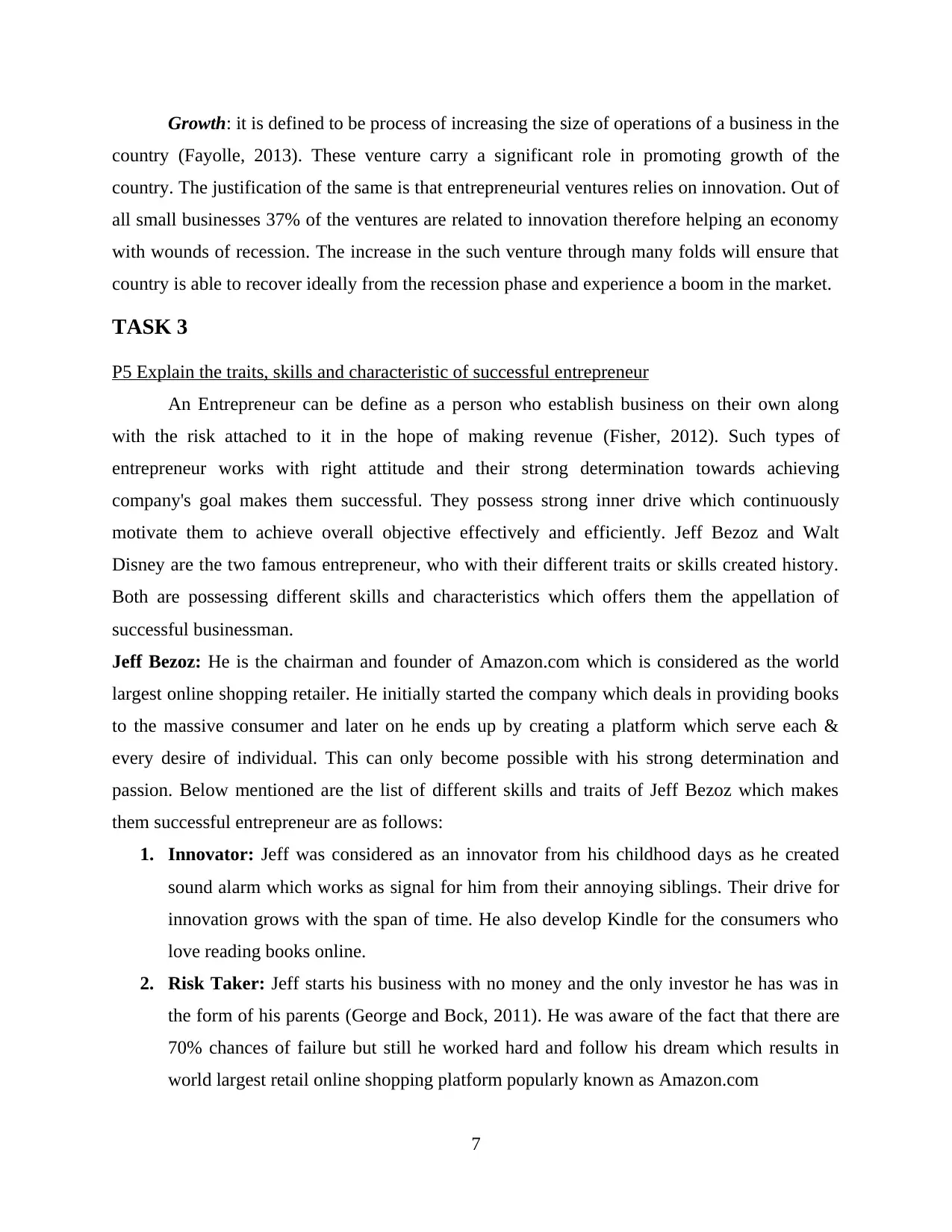
Growth: it is defined to be process of increasing the size of operations of a business in the
country (Fayolle, 2013). These venture carry a significant role in promoting growth of the
country. The justification of the same is that entrepreneurial ventures relies on innovation. Out of
all small businesses 37% of the ventures are related to innovation therefore helping an economy
with wounds of recession. The increase in the such venture through many folds will ensure that
country is able to recover ideally from the recession phase and experience a boom in the market.
TASK 3
P5 Explain the traits, skills and characteristic of successful entrepreneur
An Entrepreneur can be define as a person who establish business on their own along
with the risk attached to it in the hope of making revenue (Fisher, 2012). Such types of
entrepreneur works with right attitude and their strong determination towards achieving
company's goal makes them successful. They possess strong inner drive which continuously
motivate them to achieve overall objective effectively and efficiently. Jeff Bezoz and Walt
Disney are the two famous entrepreneur, who with their different traits or skills created history.
Both are possessing different skills and characteristics which offers them the appellation of
successful businessman.
Jeff Bezoz: He is the chairman and founder of Amazon.com which is considered as the world
largest online shopping retailer. He initially started the company which deals in providing books
to the massive consumer and later on he ends up by creating a platform which serve each &
every desire of individual. This can only become possible with his strong determination and
passion. Below mentioned are the list of different skills and traits of Jeff Bezoz which makes
them successful entrepreneur are as follows:
1. Innovator: Jeff was considered as an innovator from his childhood days as he created
sound alarm which works as signal for him from their annoying siblings. Their drive for
innovation grows with the span of time. He also develop Kindle for the consumers who
love reading books online.
2. Risk Taker: Jeff starts his business with no money and the only investor he has was in
the form of his parents (George and Bock, 2011). He was aware of the fact that there are
70% chances of failure but still he worked hard and follow his dream which results in
world largest retail online shopping platform popularly known as Amazon.com
7
country (Fayolle, 2013). These venture carry a significant role in promoting growth of the
country. The justification of the same is that entrepreneurial ventures relies on innovation. Out of
all small businesses 37% of the ventures are related to innovation therefore helping an economy
with wounds of recession. The increase in the such venture through many folds will ensure that
country is able to recover ideally from the recession phase and experience a boom in the market.
TASK 3
P5 Explain the traits, skills and characteristic of successful entrepreneur
An Entrepreneur can be define as a person who establish business on their own along
with the risk attached to it in the hope of making revenue (Fisher, 2012). Such types of
entrepreneur works with right attitude and their strong determination towards achieving
company's goal makes them successful. They possess strong inner drive which continuously
motivate them to achieve overall objective effectively and efficiently. Jeff Bezoz and Walt
Disney are the two famous entrepreneur, who with their different traits or skills created history.
Both are possessing different skills and characteristics which offers them the appellation of
successful businessman.
Jeff Bezoz: He is the chairman and founder of Amazon.com which is considered as the world
largest online shopping retailer. He initially started the company which deals in providing books
to the massive consumer and later on he ends up by creating a platform which serve each &
every desire of individual. This can only become possible with his strong determination and
passion. Below mentioned are the list of different skills and traits of Jeff Bezoz which makes
them successful entrepreneur are as follows:
1. Innovator: Jeff was considered as an innovator from his childhood days as he created
sound alarm which works as signal for him from their annoying siblings. Their drive for
innovation grows with the span of time. He also develop Kindle for the consumers who
love reading books online.
2. Risk Taker: Jeff starts his business with no money and the only investor he has was in
the form of his parents (George and Bock, 2011). He was aware of the fact that there are
70% chances of failure but still he worked hard and follow his dream which results in
world largest retail online shopping platform popularly known as Amazon.com
7
Paraphrase This Document
Need a fresh take? Get an instant paraphrase of this document with our AI Paraphraser
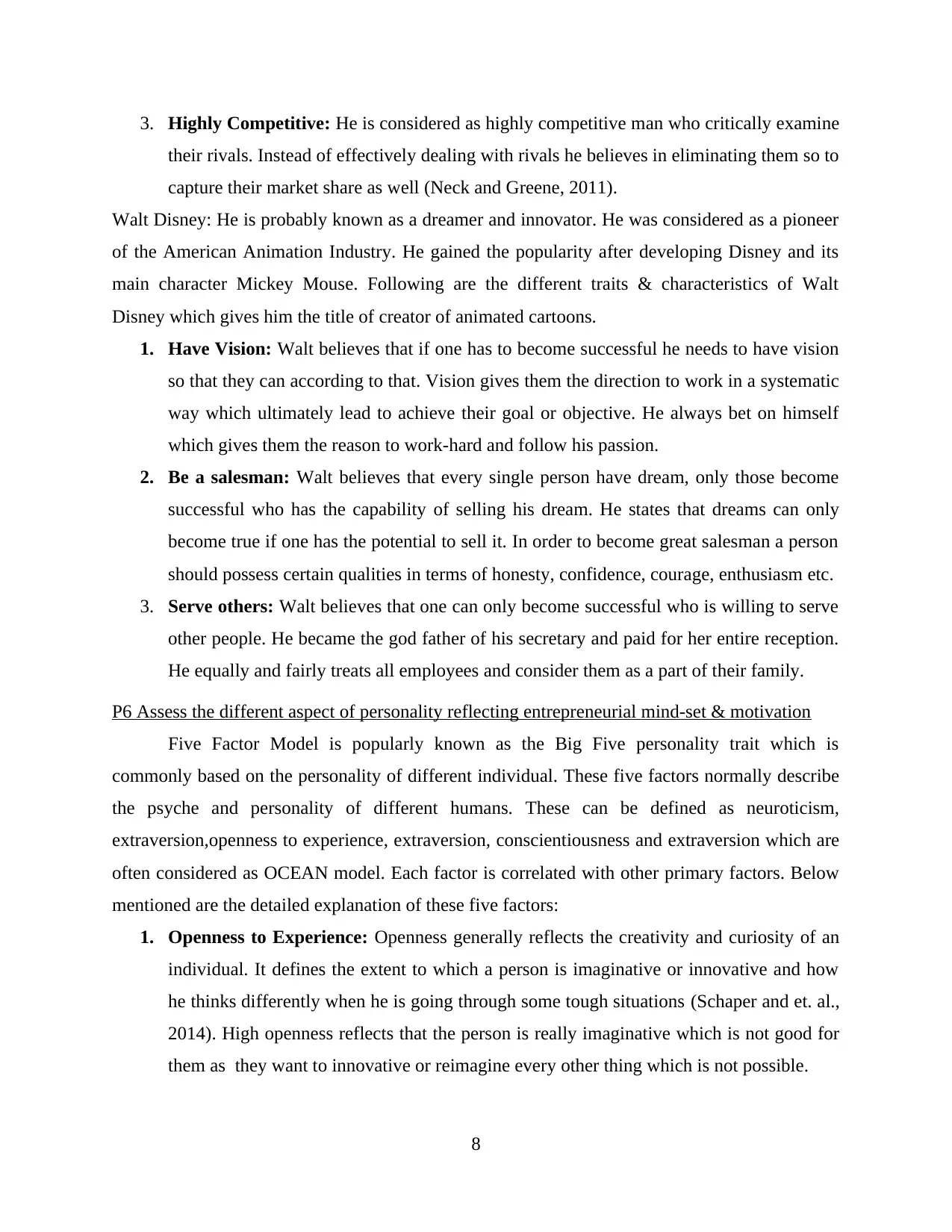
3. Highly Competitive: He is considered as highly competitive man who critically examine
their rivals. Instead of effectively dealing with rivals he believes in eliminating them so to
capture their market share as well (Neck and Greene, 2011).
Walt Disney: He is probably known as a dreamer and innovator. He was considered as a pioneer
of the American Animation Industry. He gained the popularity after developing Disney and its
main character Mickey Mouse. Following are the different traits & characteristics of Walt
Disney which gives him the title of creator of animated cartoons.
1. Have Vision: Walt believes that if one has to become successful he needs to have vision
so that they can according to that. Vision gives them the direction to work in a systematic
way which ultimately lead to achieve their goal or objective. He always bet on himself
which gives them the reason to work-hard and follow his passion.
2. Be a salesman: Walt believes that every single person have dream, only those become
successful who has the capability of selling his dream. He states that dreams can only
become true if one has the potential to sell it. In order to become great salesman a person
should possess certain qualities in terms of honesty, confidence, courage, enthusiasm etc.
3. Serve others: Walt believes that one can only become successful who is willing to serve
other people. He became the god father of his secretary and paid for her entire reception.
He equally and fairly treats all employees and consider them as a part of their family.
P6 Assess the different aspect of personality reflecting entrepreneurial mind-set & motivation
Five Factor Model is popularly known as the Big Five personality trait which is
commonly based on the personality of different individual. These five factors normally describe
the psyche and personality of different humans. These can be defined as neuroticism,
extraversion,openness to experience, extraversion, conscientiousness and extraversion which are
often considered as OCEAN model. Each factor is correlated with other primary factors. Below
mentioned are the detailed explanation of these five factors:
1. Openness to Experience: Openness generally reflects the creativity and curiosity of an
individual. It defines the extent to which a person is imaginative or innovative and how
he thinks differently when he is going through some tough situations (Schaper and et. al.,
2014). High openness reflects that the person is really imaginative which is not good for
them as they want to innovative or reimagine every other thing which is not possible.
8
their rivals. Instead of effectively dealing with rivals he believes in eliminating them so to
capture their market share as well (Neck and Greene, 2011).
Walt Disney: He is probably known as a dreamer and innovator. He was considered as a pioneer
of the American Animation Industry. He gained the popularity after developing Disney and its
main character Mickey Mouse. Following are the different traits & characteristics of Walt
Disney which gives him the title of creator of animated cartoons.
1. Have Vision: Walt believes that if one has to become successful he needs to have vision
so that they can according to that. Vision gives them the direction to work in a systematic
way which ultimately lead to achieve their goal or objective. He always bet on himself
which gives them the reason to work-hard and follow his passion.
2. Be a salesman: Walt believes that every single person have dream, only those become
successful who has the capability of selling his dream. He states that dreams can only
become true if one has the potential to sell it. In order to become great salesman a person
should possess certain qualities in terms of honesty, confidence, courage, enthusiasm etc.
3. Serve others: Walt believes that one can only become successful who is willing to serve
other people. He became the god father of his secretary and paid for her entire reception.
He equally and fairly treats all employees and consider them as a part of their family.
P6 Assess the different aspect of personality reflecting entrepreneurial mind-set & motivation
Five Factor Model is popularly known as the Big Five personality trait which is
commonly based on the personality of different individual. These five factors normally describe
the psyche and personality of different humans. These can be defined as neuroticism,
extraversion,openness to experience, extraversion, conscientiousness and extraversion which are
often considered as OCEAN model. Each factor is correlated with other primary factors. Below
mentioned are the detailed explanation of these five factors:
1. Openness to Experience: Openness generally reflects the creativity and curiosity of an
individual. It defines the extent to which a person is imaginative or innovative and how
he thinks differently when he is going through some tough situations (Schaper and et. al.,
2014). High openness reflects that the person is really imaginative which is not good for
them as they want to innovative or reimagine every other thing which is not possible.
8
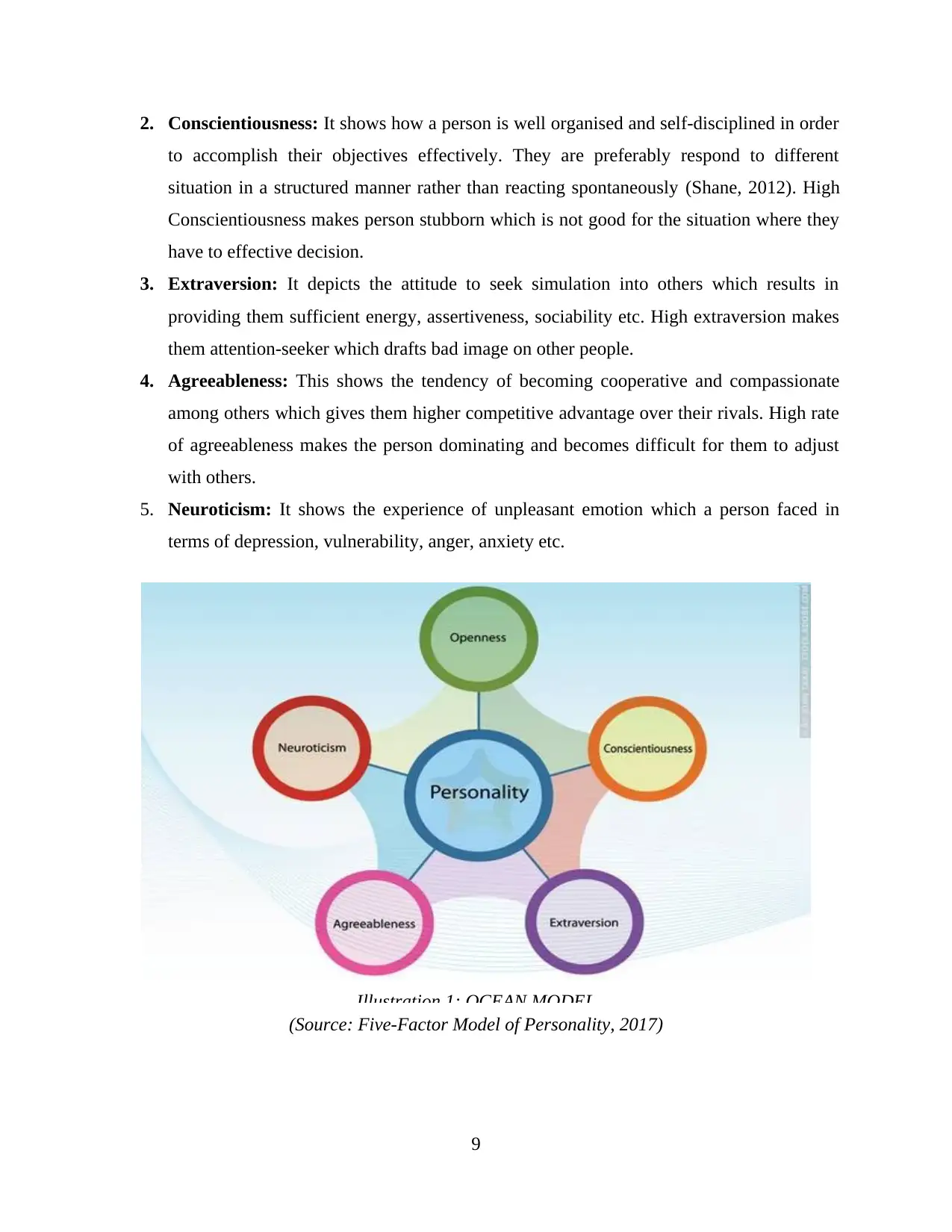
2. Conscientiousness: It shows how a person is well organised and self-disciplined in order
to accomplish their objectives effectively. They are preferably respond to different
situation in a structured manner rather than reacting spontaneously (Shane, 2012). High
Conscientiousness makes person stubborn which is not good for the situation where they
have to effective decision.
3. Extraversion: It depicts the attitude to seek simulation into others which results in
providing them sufficient energy, assertiveness, sociability etc. High extraversion makes
them attention-seeker which drafts bad image on other people.
4. Agreeableness: This shows the tendency of becoming cooperative and compassionate
among others which gives them higher competitive advantage over their rivals. High rate
of agreeableness makes the person dominating and becomes difficult for them to adjust
with others.
5. Neuroticism: It shows the experience of unpleasant emotion which a person faced in
terms of depression, vulnerability, anger, anxiety etc.
(Source: Five-Factor Model of Personality, 2017)
9
Illustration 1: OCEAN MODEL
to accomplish their objectives effectively. They are preferably respond to different
situation in a structured manner rather than reacting spontaneously (Shane, 2012). High
Conscientiousness makes person stubborn which is not good for the situation where they
have to effective decision.
3. Extraversion: It depicts the attitude to seek simulation into others which results in
providing them sufficient energy, assertiveness, sociability etc. High extraversion makes
them attention-seeker which drafts bad image on other people.
4. Agreeableness: This shows the tendency of becoming cooperative and compassionate
among others which gives them higher competitive advantage over their rivals. High rate
of agreeableness makes the person dominating and becomes difficult for them to adjust
with others.
5. Neuroticism: It shows the experience of unpleasant emotion which a person faced in
terms of depression, vulnerability, anger, anxiety etc.
(Source: Five-Factor Model of Personality, 2017)
9
Illustration 1: OCEAN MODEL
⊘ This is a preview!⊘
Do you want full access?
Subscribe today to unlock all pages.

Trusted by 1+ million students worldwide
1 out of 16
Related Documents
Your All-in-One AI-Powered Toolkit for Academic Success.
+13062052269
info@desklib.com
Available 24*7 on WhatsApp / Email
![[object Object]](/_next/static/media/star-bottom.7253800d.svg)
Unlock your academic potential
Copyright © 2020–2026 A2Z Services. All Rights Reserved. Developed and managed by ZUCOL.





